PMK
Active member
Think I am going to the Mobil 1 4t oil on my next change. I would not go over 5,000 miles on on the BRP oil. Last oil change on mine at 4400 miles, lab said that it had sheared down to just below 20 weight.
Doc, I am not claiming the M1 is a magic potion nor witches brew. Simply I use M1 in the wifes Corolla, my 2010 Tacoma in the engine, automatic transmission, rear end and power steering, The KTM 250 has it in the gearbox, forks, and hydro clutch. I even use it in some of the bicycle forks.
So M1 does well for me.
As for the Spyder, I decided on M1 Racing 4t 10/40 a while back. Could have been Rottella but went M1. Simply here's why. I know the M1 is a 10/40 as opposed to the manual specified 5/40. (Cold weather flow is a non issue where I live). If the oil starts life slightly more viscous, it should run longer until the viscosity diminishes. I have no plans to go 9300 miles. Calender wise that would be too long for our machine. Plan is around 5k on the oil, unless the calender gets long from lack of use for the Spyder.
Along with this, I will replace the $15 oil filter each oil change.
Wil Amsoil work, will Rottella work, BRP oil works also. Even other oils like Castrol, Royal Purple, Valvoline any of them, provided the viscosity is proper or close AND THE BOTTLE IS NOT LABELED ENERGY CONSERVING OR SIMILAR WHICH CONTAINS MOLY IN ENOUGH CONTENT TO TAKE OUT THE CLUTCH. After reading about the machine that went 100k on BRP oil, it is pretty reasonable to consider the engine stress is fairly low, while the gearbox will destroy the oil. In the end, neither the gearbox nor engine is non for mechanical failures. As for wear, at our current rate, 100k will be 20 years from now. By then we may be tired of the color.
The above is in regards to the 2014 / 2015 1330 powered machines. I learned a while back during an oil topic that the earlier machines require an oil that meets less of a spec or the clutch will fail. Do some research and ensure the oil you choose is proper for your machine.
PK

